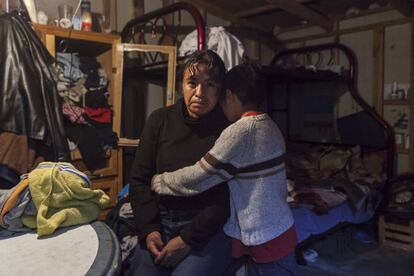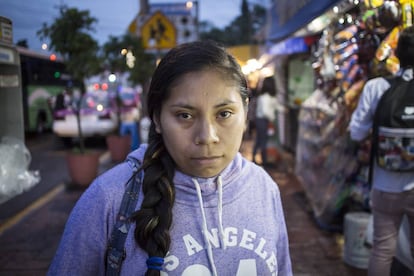US and Canada pressure Mexico to increase minimum wage
Proponents of salary hikes for the country’s poorest have found unexpected allies in NAFTA partners


María Eugenia Zamora, a 37-year-old single mother, lives in a one-room wooden shack in a shanty town on the outskirts of Mexico City. She and her 10-year-old son sleep on bunk beds, she has a tiny gas stove for cooking, no heating, and relies on an illegal connection for her electricity supply.
Zamora earns a little more than the minimum wage: 3,500 pesos, equivalent to around $200 a month for a nine-hour-a-day job as a cleaner. “It’s very hard to make ends meet, the money doesn’t go far enough,” she explains. Of her monthly income, 300 pesos goes on transportation (she spends two-and-a-half hours traveling to and from work). Another 800 goes on getting Leo to school. She spends around 1,500 pesos on food. Right now, she has to find another 1,000 pesos to pay for Leo’s school uniform and study materials. That wouldn’t be so hard for Mexico’s middle classes, but it is a fortune for the 39% of the population who, like María Eugenia, are paid just above the minimum wage.
The government and the unions are opposed to salary increases
Raymundo Campos, a researcher in economic development at the Colegio de México
According to a new report by Coneval, the state body that assesses social development policies in Mexico, the country’s minimum wage is not enough for two people to live on, never mind households of four people living on a single income.
The debate over the minimum wage in Mexico has been under the spotlight in recent weeks as the country renegotiates NAFTA. The United States and Canada are calling for an increase to the current monthly minimum wage of $125, arguing that Mexico’s low levels of pay give it an unfair competitive advantage and that it has systematically blocked efforts to increase the minimum wage for the last two decades, in the process locking millions of people into poverty.
Jerry Dias, the head of Canada’s biggest labor union, which is taking part in the NAFTA talks, has been particularly critical, accusing successive Mexican governments of “oppressing” its workers.
In Mexico, a country where 40% of the population lives below the poverty line, taking home the minimum wage, as 5% of the workforce does, is no guarantee of a decent life.
Among the lowest in Latin America, the minimum wage in Mexico rose last year from 73 pesos to 80 pesos a day. Now the government, labor unions and employers’ organizations are talking about raising it to 94 pesos a day. In the short term, an increase wouldn’t affect María Eugenia Zamora, given that she is paid slightly above the minimum wage.

“Although a wage increase wouldn’t affect all pay scales, in the long term it would impact on people who earn slightly more than the minimum,” explains Enrique Cárdenas, an economist and the former president of the University of the Americas-Puebla, and a vocal proponent of raising the minimum wage. “With inflation at above 6%, a wage hike would help Mexico’s most vulnerable recover some of their purchasing power.
Sources at Conasami, the national minimum wage commission, say that the greatest resistance to a wage hike has come not from business leaders, but from the government and the labor unions closely linked to the ruling Institutional Revolutionary Party (PRI).
We skip on lots of things and live from hand to mouth so we can send something to my mother Blanca García
“Everything is upside down,” says Raymundo Campos, a researcher in economic development at the prestigious Colegio de México, adding: “It has been shown that a modest increase in the minimum wage has no impact on prices and doesn’t cause increases in medium and high wages, but they are still opposed to it.”
Blanca García and her brother survive on 3,500 pesos a month. He has just finished high school, while she has been working since she was 15, and a decade later puts in a nine-hour day at a factory kitchen. “We skip on lots of things and live from hand to mouth so we can send something to my mother,” she explains. They have no running water. “It’s the price they pay for being poor,” says Enrique Cano, of Techo (Roof), the NGO that helped Blanca Garcia and María Eugenia Zamora build their modest homes. Around 80% of the families that Cano works with live on less than 4,800 pesos a month.
This month, Zamora says she hopes to set aside 200 pesos “for emergencies.” Perhaps, if those fighting for increases to the minimum salary are successful, in the not-too distant future her efforts may well help cover unexpected needs, and the renegotiation of NAFTA could benefit her.
English version by Nick Lyne.
Tu suscripción se está usando en otro dispositivo
¿Quieres añadir otro usuario a tu suscripción?
Si continúas leyendo en este dispositivo, no se podrá leer en el otro.
FlechaTu suscripción se está usando en otro dispositivo y solo puedes acceder a EL PAÍS desde un dispositivo a la vez.
Si quieres compartir tu cuenta, cambia tu suscripción a la modalidad Premium, así podrás añadir otro usuario. Cada uno accederá con su propia cuenta de email, lo que os permitirá personalizar vuestra experiencia en EL PAÍS.
¿Tienes una suscripción de empresa? Accede aquí para contratar más cuentas.
En el caso de no saber quién está usando tu cuenta, te recomendamos cambiar tu contraseña aquí.
Si decides continuar compartiendo tu cuenta, este mensaje se mostrará en tu dispositivo y en el de la otra persona que está usando tu cuenta de forma indefinida, afectando a tu experiencia de lectura. Puedes consultar aquí los términos y condiciones de la suscripción digital.








































